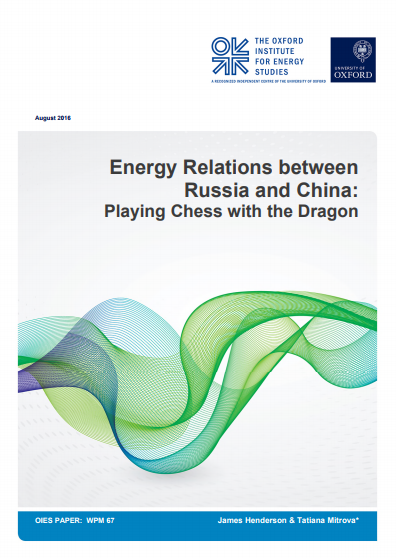Energy Relations between Russia and China: Playing Chess with the Dragon

Post-sanctions Russia-China energy relations: what expectations?
Russia's relationship with China has a long and complex history, catalysed by the lengthy border between the two countries, the complementarity of their economies and the ambitions of both to be seen as key global geo-political actors. Following periods of tension and friendship in the Soviet era, when the two communist states often struggled to find a mutual understanding, the post-Soviet era has seen a more complicated relationship develop based as much on economic reality as political ideology.
Russia's economy has suffered collapse and recovery, often driven by oil price volatility, and has yet to achieve much-craved stability and consistent growth. China, meanwhile, has genuinely become an economic superpower, having enjoyed growth rates in the 7-15% per annum range since the mid-1990s and has now become the second largest economy in the world in terms of nominal GDP.
China's rapid economic growth, which has largely been based on industrial expansion, has also seen it become, since 2009, the world's largest energy consumer, with total primary energy demand in 2015 of just over 3 billion tonnes of oil equivalent. The geographical accident that China is also located next to the world's largest owner of fossil fuel reserves means that a commercial relationship based on energy was bound to emerge, and the development of ties between the two countries based on oil, gas and coal trade has generated significant interest and discussion. In particular over the past decade, as Chinese energy imports have increased rapidly while Russia has sought new markets for its key commodities, the issues of inter-dependency, reliance and security have been at the forefront of the debate.
This paper aims to contribute to the literature on the Russia-China energy relationship by providing detailed evidence of activity in the post-sanctions period, a comprehensive review of recent negotiations and transactions, and an assessment of the current state of the balance of bargaining power and cooperation between the two countries.
This content is available at the Oxford Institute for Energy Studies' website: Energy Relations between Russia and China - Playing Chess with the Dragon

Available in:
Regions and themes
Share
Related centers and programs
Discover our other research centers and programsFind out more
Discover all our analysesRussia, the Palestinians and Gaza: Adjustments after October 7th
The Soviet Union (USSR), and subsequently the Russian Federation as its internationally recognized legal successor, has consistently sought to play a visible role in efforts to resolve the Israeli-Palestinian conflict.
Deathonomics: The Social, Political, and Economic Costs of War in Russia
The report attempts to outline and examine a truly new phenomenon in Russian society, dubbed “deathonomics”—the making of a mercenary army against the backdrop of the Kremlin’s war in Ukraine, eventually replacing both the Soviet (conscript) and early new Russian (contract) armies. It notes that, by the end of 2023, this trend had turned the military service into one of the highest-paying professions in the country, something not seen in Russia on such a scale since the late 17th century.
Russia's Asia Strategy: Bolstering the Eagle's Eastern Wing
Among Russia’s strategic priorities, Asia traditionally played a secondary role compared to the West. In the mid-1990s, then Foreign Minister Yevgeny Primakov initiated a rapprochement with China and India. Then, in 2014, deteriorating relations between Russia and the West prompted Moscow to begin its “great pivot to the East”.
Kazakhstan After the Double Shock of 2022: Political, Economic and Military Consequences
The year 2022 represented a dual shock for Kazakhstan. In January, the country faced its most severe political crisis since independence, followed in February by Russia’s full-scale invasion of Ukraine, which cast uncertainty over the borders of post-Soviet states. These consecutive crises profoundly shaped Kazakhstan’s domestic and foreign policy.










